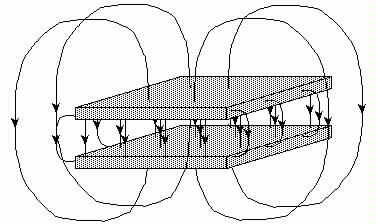Suppose a charged capacitor (parallel plates), the negative and positive charges on two plates attract each other. Which force cause the negative charge carriers (electrons) move through the circuit to the other plate if we connect two plates (from outer sides) with a wire?
2 Answers
Every system likes to decrease its electrostatic energy.
The charges on the plates are almost in stable equilibrium. The charges on the opposite plates attract them, and the charges on the same plate repel them with almost the same force.
However, a capacitor has fringe fields:

These may be negligible when calculating the field inside a capacitor, but they are extremely important when there are wires in play -- by $\vec J=\sigma\vec E$, for a wire (which has high $\sigma$), even a small $\vec E$ can create a large current.
And these create the tiny perturbation required to push the charges out of their almost-stable equilibrium.
Note that redistribution of surface charges occurs on the wires as well, so it's not just the fringe fields pushing the electrons.
-
$\begingroup$ This is almost what I was looking for but it seems the attraction between positive and negative charges is stronger than the effect of fringe fields (as your picture says) but still charges move in to wire! $\endgroup$– richardCommented Apr 6, 2013 at 10:47
-
$\begingroup$ @Richard: They can't move in the space in between. So they go the long way around. A tiny force is enough to nudge them to follow that path. $\endgroup$ Commented Apr 6, 2013 at 12:34
The charges move due to potential drop between two plates $V=Q/C$. The charges move to cancel out net charge and thus lower the energy of system from $\dfrac{CV^2}2$ to $0$. And all systems tend to reduce their energy by law of nature.
